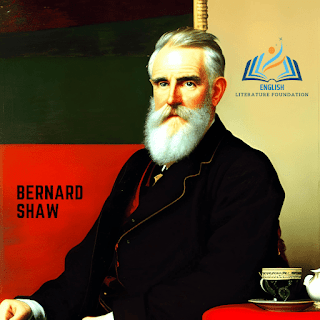The Arms and the Man by Bernard Shaw: A Detailed Summary
Bernard Shaw's "The Arms and the Man" is a comedic
play that satirizes the romanticism of war and love in the late 19th century.
The play was first performed in 1894 and has since become one of Shaw's most
popular and beloved works. In this article, we will provide a detailed summary
of the play, analyze its themes and characters, discuss its importance and
reception, and offer some personal thoughts and reflections.
I. Introduction
A. Brief background of Bernard Shaw
Bernard Shaw was a prolific Irish playwright and critic who
lived from 1856 to 1950. He was known for his sharp wit, political commentary,
and progressive views on social issues. Shaw wrote over 60 plays throughout his
career, including "Pygmalion," "Man and Superman," and
"Saint Joan." He was awarded the Nobel Prize in Literature in 1925.
B. Overview of "The Arms and the Man"
"The Arms and
the Man" is one of Shaw's most famous plays, and is a satirical take on
the romanticism of war and love. The play is set during the Serbo-Bulgarian War
of 1885, and follows the story of Raina Petkoff, a young Bulgarian woman who is
engaged to Major Sergius Saranoff, a war hero. The arrival of a Swiss mercenary
soldier named Captain Bluntschli complicates things, and Raina must confront
her idealistic views of love and heroism.
C. Importance of the play
"The Arms and the Man" is an important play
because it reflects Shaw's own political and social views, particularly his
belief in the futility of war and the importance of individualism. The play
also challenges traditional gender roles and expectations, with Raina serving
as a strong female protagonist. The play's themes and characters continue to
resonate with audiences today, making it a timeless work of literature.
II. Plot Summary
A. Act I
Setting and characters introduced
"The Arms and the Man" is
set during the Serbo-Bulgarian War of 1885, in the home of the Petkoff family
in Bulgaria. The main characters are introduced, including Raina Petkoff, her
mother Catherine Petkoff, and Raina's fiancé Major Sergius Saranoff.
Raina and Sergius' engagement
Raina and Sergius' engagement is announced,
and Raina basks in the attention she receives as the fiancée of a war hero.
However, it becomes clear that their relationship is not as perfect as it
seems, with Raina harbouring doubts about Sergius' character.
Captain Bluntschli's arrival
Captain Bluntschli, a Swiss
mercenary soldier, arrives at the Petkoff home seeking refuge from the war.
Raina is initially repulsed by his lack of romanticism and idealism, but is
eventually drawn to his practicality and honesty.
Bluntschli's hiding place discovered
Bluntschli is discovered hiding in
Raina's bedroom by her father, but manages to talk his way out of trouble by
claiming that he is searching for chocolates. Raina, impressed by Bluntschli's
resourcefulness, helps him escape undetected.
B. Act II and III
Raina and Bluntschli's growing relationship
Raina and Bluntschli's relationship
grows, with Raina coming to realise that her idealistic views of love and
heroism are misguided. Bluntschli challenges Raina's beliefs, leading to a
confrontation between the two.
Major Petkoff's discovery
Major Petkoff discovers that Bluntschli is in
possession of a number of Petkoff family heirlooms, which he had stolen from
the house earlier. Bluntschli explains that he took the items as collateral for
payment for his services as a soldier, but offers to return them to avoid
getting into trouble.
Sergius' confrontation with Bluntschli
Sergius confronts Bluntschli about
his relationship with Raina, but is forced to back down when Bluntschli reveals
that he knows about Sergius' infidelity with Raina's maid, Louka.
Resolution of the love triangle
Raina must choose between the two men in her
life - Sergius and Bluntschli. She ultimately chooses Bluntschli, who
represents practicality and honesty over Sergius' romanticism and idealism.
C. Act IV
Resolution of the war
The war ends, and the characters
must come to terms with the changes that have taken place. The Petkoffs are no
longer the wealthy and influential family they once were, and Raina must adjust
to a new way of life with Bluntschli.
Final revelations
The final revelations occur,
including the fact that Raina's father had helped Bluntschli escape, and that
Louka is in love with Sergius. Raina and Bluntschli ultimately choose to be
together, despite the challenges they face as a result of their different
backgrounds and social status.
D. Themes
War and its effects
One of the major themes in
"The Arms and the Man" is the impact of war on individuals and
society. The play explores the disillusionment of soldiers like Bluntschli, who
sees through the romanticised notions of heroism and patriotism, and the
Petkoff family's struggle to come to terms with their loss of wealth and status
as a result of the war.
Love and idealism vs. practicality
The play also explores the theme of love and
the conflict between idealistic notions of love and practical considerations.
Raina initially idealises Sergius as a heroic figure, but comes to realise that
he is flawed and not the perfect match for her. Bluntschli, on the other hand,
represents practicality and honesty, which ultimately win over Raina's heart.
Social class and status
Another important theme in the play
is social class and status. The Petkoffs are part of the Bulgarian aristocracy,
and their status is an important factor in their lives. Raina is initially
drawn to Sergius because of his status as a war hero, but ultimately chooses
Bluntschli despite his lower social standing.
Gender roles and expectations
The play also explores gender roles
and expectations, with Raina initially fulfilling the traditional role of a
young woman in love with a heroic man. However, as the play progresses, she
begins to challenge these expectations and becomes more independent in her
thinking and actions.
E. Analysis
"The Arms and
the Man" is a satirical play that challenges the romanticised notions of
war and love that were prevalent in Shaw's time. The play explores the impact
of war on individuals and society, as well as the conflict between idealistic
notions of love and practical considerations. Shaw also uses the play to
comment on social class and gender roles, challenging traditional expectations
and norms. Overall, "The Arms and the Man" is a thought-provoking
play that still resonates with audiences today.
F. Conclusion
"The Arms and the Man" is a satirical play that
challenges the romanticised notions of war and love that were prevalent in
Shaw's time. Through its exploration of themes such as war and its effects,
love and idealism versus practicality, social class and status, and gender
roles and expectations, the play provides a thought-provoking commentary on
society and human nature. Despite being over a century old, "The Arms and
the Man" still remains relevant and engaging to modern audiences.
FAQs:
- Who
wrote "The Arms and the Man"? "The Arms and the Man"
was written by George Bernard Shaw, a famous Irish playwright and social
critic.
- When
was "The Arms and the Man" first performed? "The Arms and
the Man" was first performed on April 21, 1894.
- Where
is "The Arms and the Man" set? "The Arms and the Man"
is set in Bulgaria during the Serbo-Bulgarian War of 1885.
- What
is the main conflict in "The Arms and the Man"? The main
conflict in "The Arms and the Man" is the conflict between
idealistic notions of love and practical considerations.
- What
themes are explored in "The Arms and the Man"? Themes explored
in "The Arms and the Man" include war and its effects, love and
idealism versus practicality, social class and status, and gender roles
and expectations.

